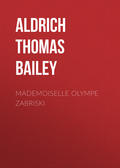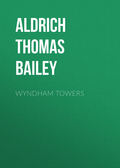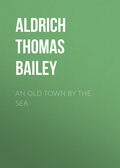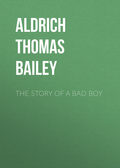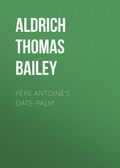
Aldrich Thomas Bailey
The Stillwater Tragedy
XI
In spite of Mr. Slocum's stipulations respecting the frequency of Margaret's visits to the studio, she was free to come and go as she liked. It was easy for him to say, Be good friends, and nothing beyond; but after that day in the workshop it was impossible for Richard and Margaret to be anything but lovers. The hollowness of pretending otherwise was clear even to Mr. Slocum. In the love of a father for a daughter there is always a vague jealousy which refuses to render a coherent explanation of itself. Mr. Slocum did not escape this, but he managed, nevertheless, to accept the inevitable with very fair grace, and presently to confess to himself that the occurrence which had at first taken him aback was the most natural in the world. That Margaret and Richard, thrown together as they had been, should end by falling in love with each other was not a result to justify much surprise. Indeed, there was a special propriety in their doing so. The Shackfords had always been reputable people in the village,–down to Lemuel Shackford, who of course as an old musk-rat. The family attributes of amiability and honesty had skipped him, but they had reappeared in Richard. It was through his foresight and personal energy that the most lucrative branch of the trade had been established. His services entitled him to a future interest in the business, and Mr. Slocum had intended he should have it. Mr. Slocum had not dreamed of throwing in Margaret also; but since that addition had suggested itself, it seemed to him one of the happy features of the arrangement. Richard would thus be doubly identified with the yard, to which, in fact, he had become more necessary than Mr. Slocum himself.
"He has more backbone with the men than I have," acknowledged Mr. Slocum. "He knows how to manage them, and I don't."
As soft as Slocum was a Stillwater proverb. Richard certainly had plenty of backbone; it was his only capital. In Mr. Slocum's estimation it was sufficient capital. But Lemuel Shackford was a very rich man, and Mr. Slocum could not avoid seeing that it would be decent in Richard's only surviving relative if, at this juncture, he were to display a little interest in the young fellow's welfare.
"If he would only offer to advance a few thousand dollars for Richard," said Mr. Slocum, one evening, to Margaret, with whom he had been talking over the future–"the property must all come to him some time,–it would be a vast satisfaction to me to tell the old man that we can get along without any of his ill-gotten gains. He made the bulk of his fortune during the war, you know. The old sea-serpent," continued Mr. Slocum, with hopeless confusion of metaphor, "had a hand in fitting out more than one blockade-runner. They used to talk of a ship that got away from Charleston with a cargo of cotton that netted the share-holders upwards of two hundred thousand dollars. He denies it now, but everybody knows Shackford. He'd betray his country for fifty cents in postage-stamps."
"Oh, papa! you are too hard on him."
In words dropped cursorily from time to time, Margaret imparted to Richard the substance of her father's speech, and it set Richard reflecting. It was not among the probabilities that Lemuel Shackford would advance a dollar to establish Richard, but if he could induce his cousin even to take the matter into consideration, Richard felt that it would be a kind of moral support to him circumstanced as he was. His pride revolted at the idea of coming quite unbacked and disowned, as well as empty-handed, to Mr. Slocum.
For the last twelve months there had been a cessation of ordinary courtesies between the two cousins. They now passed each other on the street without recognition. A year previously Mr. Shackford had fallen ill, and Richard, aware of the inefficient domestic arrangements in Welch's Court, had gone to the house out of sheer pity. The old man was in bed, and weak with fever, but at seeing Richard he managed to raise himself on one elbow.
"Oh, it's you!" he exclaimed, mockingly. "When a rich man is sick the anxious heirs crowd around him; but they're twice as honestly anxious when he is perfectly well."
"I came to see if I could do anything for you!" cried Richard, with a ferocious glare, and in a tone that went curiously with his words, and shook to the foundations his character of Good Samaritan.
"The only thing you can do for me is to go away."
"I'll do that with pleasure," retorted Richard bitterly.
And Richard went, vowing he would never set foot across the threshold again. He could not help having ugly thoughts. Why should all the efforts to bring about a reconciliation and all the forbearance be on his side? Thenceforth the crabbed old man might go to perdition if he wanted to.
And now here was Richard meditating a visit to that same house to beg a favor!
Nothing but his love for Margaret could have dragged him to such a banquet of humble-pie as he knew was spread for his delectation, the morning he passed up the main street of Stillwater and turned into Welch's Court.
As Richard laid his hand on the latch of the gate, Mr. Shackford, who was digging in the front garden, looked up and saw him. Without paying any heed to Richard's amicable salutation, the old man left the shovel sticking in the sod, and walked stiffly into the house. At another moment this would have amused Richard, but now he gravely followed his kinsman, and overtook him at the foot of the staircase.
"Cousin Shackford, can you spare me five or ten minutes?"
"Don't know as I can," said Mr. Shackford, with one foot on the lower stair. "Time is valuable. What do you want? You want something."
"Certainly, or I wouldn't think of trespassing on your time."
"Has Slocum thrown you over?" inquired the old man, turning quickly. A straw which he held between his thin lips helped to give him a singularly alert expression.
"No; Mr. Slocum and I agree the best in the world. I want to talk with you briefly on certain matters; I want to be on decent terms with you, if you will let me."
"Decent terms means money, doesn't it?" asked Mr. Shackford, with a face as wary and lean as a shark's.
"I do wish to talk about money, among other things," returned Richard, whom this brutal directness disconcerted a little,–"money on satisfactory security."
"You can get it anywhere with that."
"So I might, and be asking no favor; but I would rather get it of you, and consider it an obligation."
"I would rather you wouldn't."
"Listen to me a moment."
"Well, I'm listening."
Mr. Shackford stood in an attitude of attention, with his head canted on one side, his eyes fixed on the ceiling, and the straw between his teeth tilted up at an angle of forty degrees.
"I have, as you know, worked my way in the marble yard to the position of general manager," began Richard.
"I didn't know," said Mr. Shackford, "but I understand. You're a sort of head grave-stone maker."
"That is taking a rather gloomy view of it," said Richard, "but no matter. The point is, I hold a responsible position, and I now have a chance to purchase a share in the works."
"Slocum is willing to take you in, eh?"
"Yes."
"Then the concern is hit."
"Hit?"
"Slocum is going into bankruptcy."
"You are wrong there. The yard was never so prosperous; the coming year we shall coin money like a mint."
"You ought to know," said Mr. Shackford, ruminatively. "A thing as good as a mint must be a good thing."
"If I were a partner in the business, I could marry Margaret."
"Who's Margaret?"
"Mr. Slocum's daughter."
"That's where the wind is! Now how much capital would it take to do all that?" inquired Mr. Shackford, with an air of affable speculation.
"Three or four thousand dollars,–perhaps less."
"Well, I wouldn't give three or four cents to have you marry Slocum's daughter. Richard, you can't pull any chestnuts out of the fire with my paw."
Mr. Shackford's interrogation and his more than usual conciliatory manner had lighted a hope which Richard had not brought with him. Its sudden extinguishment was in consequence doubly aggravating.
"Slocum's daughter!" repeated Mr. Shackford. "I'd as soon you would marry Crazy Nan up at the work-house."
The association of Crazy Nan with Margaret sent a red flush into Richard's cheek. He turned angrily towards the door, and then halted, recollecting the resolve he had made not to lose his temper, come what would. If the interview was to end there it had better not have taken place.
"I had no expectation that you would assist me pecuniarily," said Richard, after a moment. "Let us drop the money question; it shouldn't have come up between us. I want you to aid me, not by lending me money, but by giving me your countenance as the head of the family,–by showing a natural interest in my affairs, and seeming disposed to promote them."
"By just seeming?"
"That is really all I desire. If you were to propose to put capital into the concern, Mr. Slocum would refuse it."
"Slocum would refuse it! Why in the devil should he refuse it?"
"Because"–Richard hesitated, finding himself unexpectedly on delicate ground–"because he would not care to enter into business relations with you, under the circumstances."
Mr. Shackford removed the straw from his mouth, and holding it between his thumb and forefinger peered steadily through his half-closed eyelids at Richard.
"I don't understand you."
"The dispute you had long ago, over the piece of meadow land behind the marble yard. Mr. Slocum felt that you bore on him rather heavily in that matter, and has not quite forgiven you for forcing him to rebuild the sheds."
"Bother Slocum and his sheds! I understand him. What I don't understand is you. I am to offer Slocum three or four thousand dollars to set you up, and he is to decline to take it. Is that it?"
"That is not it at all," returned Richard. "My statement was this: If you were to propose purchasing a share for me in the works, Mr. Slocum would not entertain the proposition, thinking–as I don't think–that he would mortify you by the refusal of your money."
"The only way Slocum could mortify me would be by getting hold of it. But what are you driving at, anyhow? In one breath you demand several thousand dollars, and in the next breath you tell me that nobody expects it, or wants it, or could be induced to have it on any terms. Perhaps you will inform me what you are here for?"
"That is what you will never discover!" cried Richard. "It is not in you to comprehend the ties of sympathy that ought to hold between two persons situated as we are. In most families this sympathy binds closely at times,–at christenings, or burials, or when some member is about to take an important step in life. Generally speaking, blood is thicker than water; but your blood, cousin Shackford, seems to be a good deal thinner. I came here to consult with you as my sole remaining kinsman, as one authorized by years and position to give me wise counsel and kindly encouragement at the turning point in my fortune. I didn't wish to go among those people like a tramp, with neither kith nor kin to say a word for me. Of course you don't understand that. How should you? A sentiment of that kind is something quite beyond your conception."
Richard's words went into one ear and out the other, without seeming for an instant to arrest Mr. Shackford's attention. The idea of Slocum not accepting money–anybody's money–presented itself to Mr. Shackford in so facetious a light as nearly to throw him into good humor. His foot was on the first step of the staircase, which he now began slowly to mount, giving vent, as he ascended, to a series of indescribable chuckles. At the top of the landing he halted, and leaned over the rail.
"To think of Slocum refusing,–that's a good one!"
In the midst of his jocularity a sudden thought seemed to strike Mr. Shackford; his features underwent a swift transformation, and as he grasped the rail in front of him with both hands a malicious cunning writhed and squirmed in every wrinkle of his face.
"Sir!" he shrieked, "it was a trap! Slocum would have taken it! If I had been ass enough to make any such offer, he would have jumped at it. What do you and Slocum take me for? You're a pair of rascals!"
Richard staggered back, bewildered and blinded, as if he had received a blow in the eyes.
"No," continued Mr. Shackford, with a gesture of intense contempt, "you are less than rascals. You are fools. A rascal has to have brains!"
"You shameless old man!" cried Richard, as soon as he could get his voice.
To do Mr. Shackford justice, he was thoroughly convinced that Richard had lent himself to a preposterous attempt to obtain money from him. The absence of ordinary shrewdness in the method stamped it at once as belonging to Slocum, of whose mental calibre Mr. Shackford entertained no flattering estimate.
"Slocum!" he muttered, grinding the word between his teeth. "Family ties!" he cried, hurling the words scornfully over the banister as he disappeared into one of the upper chambers.
Richard stood with one hand on the newel-post, white at the lip with rage. For a second he had a wild impulse to spring up the staircase, but, controlling this, he turned and hurried out of the house.
At the gate he brushed roughly against a girl, who halted and stared. It was a strange thing to see Mr. Richard Shackford, who always had a pleasant word for a body, go by in that blind, excited fashion, striking one fist into the palm of the other hand, and talking to his own self! Mary Hennessey watched him until he wheeled out of Welch's Court, and then picking up her basket, which she had rested on the fence, went her way.
XII
At the main entrance to the marble works Richard nearly walked over a man who was coming out, intently mopping his forehead with a very dirty calico handkerchief. It was an English stone-dresser named Denyven. Richard did not recognize him at first.
"That you, Denyven!… what has happened!"
"I've 'ad a bit of a scrimmage, sir."
"A scrimmage in the yard, in work hours!"
The man nodded.
"With whom?"
"Torrini, sir,–he's awful bad this day."
"Torrini,–it is always Torrini! It seems odd that one man should be everlastingly at the bottom of everything wrong. How did it happen? Give it to me straight, Denyven; I don't want a crooked story. This thing has got to stop in Slocum's Yard."
"The way of it was this, sir: Torrini wasn't at the shop this morning. He 'ad a day off."
"I know."
"But about one o'clock, sir, he come in the yard. He 'ad been at the public 'ouse, sir, and he was hummin'. First he went among the carvers, talking Hitalian to 'em and making 'em laugh, though he was in a precious bad humor hisself. By and by he come over to where me and my mates was, and began chaffin' us, which we didn't mind it, seeing he was 'eavy in the 'ead. He was as clear as a fog 'orn all the same. But when he took to banging the tools on the blocks, I sings out, ''Ands off!' and then he fetched me a clip. I was never looking for nothing less than that he'd hit me. I was a smiling at the hinstant."
"He must be drunker than usual."
"Hevidently, sir. I went down between two slabs as soft as you please. When I got on my pins, I was for choking him a bit, but my mates hauled us apart. That's the 'ole of it, sir. They'll tell you the same within."
"Are you hurt, Denyven?"
"Only a bit of a scratch over the heye, sir,–and the nose," and the man began mopping his brow tenderly. "I'd like to 'ave that Hitalian for about ten minutes, some day when he's sober, over yonder on the green."
"I'm afraid he would make the ten minutes seem long to you."
"Well, sir, I'd willingly let him try his 'and."
"How is it, Denyven," said Richard, "that you and sensible workingmen like you, have permitted such a quarrelsome and irresponsible fellow to become a leader in the Association? He's secretary, or something, isn't he?"
"Well, sir, he writes an uncommonly clean fist, and then he's a born horator. He's up to all the parli'mentary dodges. Must 'ave 'ad no end of hexperience in them sort of things on the other side."
"No doubt,–and that accounts for him being over here."
"As for horganizing a meeting, sir"–
"I know. Torrini has a great deal of that kind of ability; perhaps a trifle too much for his own good or anybody else's. There was never any trouble to speak of among the trades in Stillwater till he and two or three others came here with foreign grievances. These men get three times the pay they ever received in their own land, and are treated like human beings for the first time in their lives. But what do they do? They squander a quarter of their week's wages at the tavern,–no rich man could afford to put a fourth of his income into drink,–and make windy speeches at the Union. I don't say all of them, but too many of them. The other night, I understand, Torrini compared Mr. Slocum to Nero,–Mr. Slocum, the fairest and gentlest man that ever breathed! What rubbish!"
"It wasn't just that way, sir. His words was, and I 'eard him,–'from Nero down to Slocum.'"
"It amounts to the same thing, and is enough to make one laugh, if he didn't make one want to swear. I hear that that was a very lively meeting the other night. What was that nonsense about 'the privileged class'?"
"Well, there is a privileged class in the States."
"So there is, but it's a large class, Denyven. Every soul of us has the privilege of bettering out condition if we have the brain and the industry to do it. Energy and intelligence come to the front, and have the right to be there. A skillful workman gets double the pay of a bungler, and deserves it. Of course there will always be rich and poor, and sick and sound, and I don't see how that can be changed. But no door is shut against ability, black or white. Before the year 2400 we shall have a chrome-yellow president and a black-and-tan secretary of the treasury. But, seriously, Denyven, whoever talks about privileged classes here does it to make mischief. There are certain small politicians who reap their harvest in times of public confusion, just as pickpockets do. Nobody can play the tyrant or the bully in this country,–not even a workingman. Here's the Association dead against an employer who, two years ago, ran his yard full-handed for a twelvemonth at a loss, rather than shut down, as every other mill and factory in Stillwater did. For years and years the Association has prevented this employer from training more than two apprentices annually. The result is, eighty hands find work, instead of a hundred and eighty. Now, that can't last."
"It keeps wages fixed in Stillwater, sir."
"It keeps out a hundred workmen. It sends away capital."
"Torrini says, sir"–
"Steer clear of Torrini and what he says. He's a dangerous fellow–for his friends. It is handsome in you, Denyven, to speak up for him–with that eye of yours."
"Oh, I don't love the man, when it comes to that; but there's no denying he's right smart," replied Denyven, who occasionally marred his vernacular with Americanisms. "The Association couldn't do without him."
"But Slocum's Yard can," said Richard, irritated to observe the influence Torrini exerted on even such men as Denyven.
"That's between you and him, sir, of course, but"–
"But what?"
"Well, sir, I can't say hexactly; but if I was you I would bide a bit."
"No, I think Torrini's time has come."
"I don't make bold to advise you, sir. I merely throws out the hobservation."
With that Denyven departed to apply to his bruises such herbs and simples as a long experience had taught him to be efficacious.
He had gone only a few rods, however, when it occurred to him that there were probabilities of a stormy scene in the yard; so he turned on his tracks, and followed Richard Shackford.
Torrini was a Neapolitan, who had come to the country seven or eight years before. He was a man above the average intelligence of his class; a marble worker by trade, but he had been a fisherman, a mountain guide among the Abruzzi, a soldier in the papal guard, and what not, and had contrived to pick up two or three languages, among the rest English, which he spoke with purity. His lingual gift was one of his misfortunes.
Among the exotics in Stillwater, which even boasted a featureless Celestial, who had unobtrusively extinguished himself with a stove-pipe hat, Torrini was the only figure that approached picturesqueness. With his swarthy complexion and large, indolent eyes, in which a southern ferocity slept lightly, he seemed to Richard a piece out of his own foreign experience. To him Torrini was the crystallization of Italy, or so much of that Italy as Richard had caught a glimpse of at Genoa. To the town-folks Torrini perhaps vaguely suggested hand-organs and eleemosynary pennies; but Richard never looked at the straight-limbed, handsome fellow without recalling the Phrygian-capped sailors of the Mediterranean. On this account, and for other reasons, Richard had taken a great fancy to the man. Torrini had worked in the ornamental department from the first, and was a rapid and expert carver when he chose. He had carried himself steadily enough in the beginning, but in these later days, as Mr. Slocum had stated, he was scarcely ever sober. Richard had stood between him and his discharge on several occasions, partly because he was so skillful a workman, and partly through pity for his wife and children, who were unable to speak a word of English. But Torrini's influence on the men in the yard,–especially on the younger hands, who needed quite other influences,–and his intemperate speeches at the trades-union, where he had recently gained a kind of ascendancy by his daring, were producing the worst effects.
At another hour Richard might have been inclined to condone this last offense, as he had condoned others; but when he parted from Denyven, Richard's heart was still hot with his cousin's insult. As he turned into the yard, not with his usual swinging gait, but with a quick, wide step, there was an unpleasant dilation about young Shackford's nostrils.
Torrini was seated on a block of granite in front of the upper sheds, flourishing a small chisel in one hand and addressing the men, a number of whom had stopped work to listen to him. At sight of Richard they made a show of handling their tools, but it was so clear something grave was going to happen that the pretense fell through. They remained motionless, resting on their mallets, with their eyes turned towards Richard. Torrini followed the general glance, and pause din his harangue.
"Talk of the devil!" he muttered, and then, apparently continuing the thread of his discourse, broke into a strain of noisy declamation.
Richard walked up to him quietly.
"Torrini," he said, "you can't be allowed to speak here, you know."
"I can speak where I like," replied Torrini gravely. He was drunk, but the intoxication was not in his tongue. His head, as Denyven had asserted, was as clear as a fog-horn.
"When you are sober, you can come to the desk and get your pay and your kit. You are discharged from the yard."
Richard was standing within two paces of the man, who looked up with an uncertain smile, as if he had not quite taken in the sense of the words. Then, suddenly straightening himself, he exclaimed,–
"Slocum don't dare do it!"
"But I do."
"You!"
"When I do a thing Mr. Slocum backs me."
"But who backs Slocum,–the Association, may be?"
"Certainly the Association ought to. I want you to leave the yard now."
"He backs Slocum," said Torrini, settling himself on the block again, "and Slocum backs down," at which there was a laugh among the men.
Richard made a step forward.
"Hands off!" cried a voice from under the sheds.
"Who said that?" demanded Richard, wheeling around. No one answered, but Richard had recognized Durgin's voice. "Torrini, if you don't quit the yard in two minutes by the clock yonder, I shall put you out by the neck. Do you understand?"
Torrini glared about him confusedly for a moment, and broke into voluble Italian; then, without a warning gesture, sprung to his feet and struck at Richard. A straight red line, running vertically the length of his cheek, showed where the chisel had grazed him. The shops were instantly in a tumult, the men dropping their tools and stumbling over the blocks, with cries of "Keep them apart!" "Shame on you!" "Look out, Mr. Shackford!"
"Is it mad ye are, Torrany!" cried Michael Hennessey, hurrying from the saw-bench. Durgin held him back by the shoulders.
"Let them alone," said Durgin.
The flat steel flashed again in the sunlight, but fell harmlessly, and before the blow could be repeated, Richard had knitted his fingers in Torrini's neckerchief and twisted it so tightly that the man gasped. Holding him by this, Richard dragged Torrini across the yard, and let him drop on the sidewalk outside the gate, where he lay in a heap, inert.
"That was nate," said Michael Hennessey, sententiously.
Richard stood leaning on the gate-post to recover he breath. His face was colorless, and the crimson line defined itself sharply against the pallor; but the rage was dead within him. It had been one of his own kind of rages,–like lightning out of a blue sky. As he stood there a smile was slowly gathering on his lip.
A score or two of the men had followed him, and now lounged in a half-circle a few paces in the rear. When Richard was aware of their presence, the glow came into his eyes again.
"Who ordered you to knock off work?"
"That was a foul blow of Torrini's, sir," said Stevens, stepping forward, "and I for one come to see fair play."
"Give us your 'and, mate!" cried Denyven; "there's a pair of us."
"Thanks," said Richard, softening at once, "but there's no need. Every man can go to his job. Denyven may stay, if he likes."
The men lingered a moment, irresolute, and returned to the sheds in silence.
Presently Torrini stretched out one leg, then the other, and slowly rose to his feet, giving a stupid glance at his empty hands as he did so.
"Here's your tool," said Richard, stirring the chisel with the toe of his boot, "if that's what you're looking for."
Torrini advanced a step as if to pick it up, then appeared to alter his mind, hesitated perhaps a dozen seconds, and turning abruptly on his heel walked down the street without a stagger.
"I think his legs is shut off from the rest of his body by water-tight compartments," remarked Denyven, regarding Torrini's steady gait with mingled amusement and envy. "Are you hurt, sir?"
"Only a bit of a scratch of the heye," replied Richard, with a laugh.
"As I hobserved just now to Mr. Stevens, sir, there's a pair of us!"



